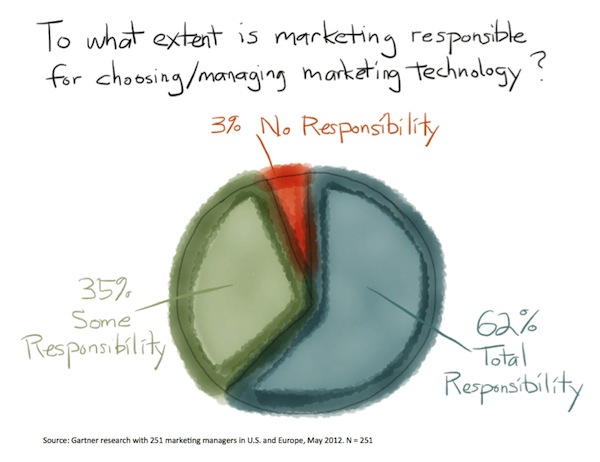I was a bit flabbergasted when I wrote yesterday’s post noting that, according to a recent ITSMA and VisionEdge Marketing report, 59% of marketers don’t specify what they want in the marketing technology purchase process.
I just couldn’t wrap my head around the magnitude of that number. Could that many marketers in 2012 be that disconnected from the modern tools of their trade? I can imagine a lot of excuses — semi-legitimate reasons for why some marketers might still be out of that loop — but not enough to justify 59%.
So last night, after a shot of whiskey, I went looking for corroborating or dissenting evidence.
Luckily (?) I found the latter:
A recent webinar by Laura McLellan of Gartner — Profile of Marketing as a Major Technology Buyer — included a slide claiming that now almost all marketers have responsibility for choosing marketing technology.
Of 251 marketing managers surveyed in the U.S. and Europe in May 2012, 62% reported that marketing has total responsibility for choosing and managing marketing technology; another 35% claimed some responsibility; and only 3% said they had no responsibility.
That sounds more like what I expected! In fact, it sounds better than I expected.
But how could this be so different than the report from yesterday’s post? I know the folks at both ITSMA and Gartner, and I have high regard for their research discipline — so I don’t doubt the methodology or math of either of these reports. Instead, I think the difference can be attributed to a combination of the following factors:
- The survey questions — and the context in which they were presented — are subtly but significantly different: having “responsibility” for something may be easier to acknowledge than identifying particular steps of formal technical purchase funnel such as “specification,” “recommendation,” and “selection.”
- Particularly in large companies, different people in the same marketing department may have different views of the technology adoption process; it’s conceivable that a non-technical marketing manager working on specific programs may not be fully aware of the role that a marketing operations or marketing technology team plays in the process.
- There are a lot of different companies out there, and in both cases, these surveys have relatively small sample sizes (N=155 and N=251 respectively); each of them may have been drawing from different sets — some sort of selection bias — or simply encountering normal statistical variance across such a large and diverse population.
In other word, these results aren’t apples-to-apples comparisons.
Nonetheless, the gulf between these two reports serves as a cautionary reminder of the varied and evolving state of marketing technology management today. If the answer changes depending on who you ask, when you ask, and how you phrase the question, then we know the journey isn’t over yet.
The real question is: who controls marketing technology in your organization?



